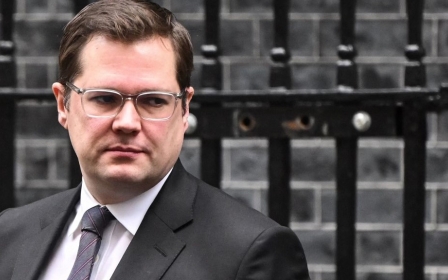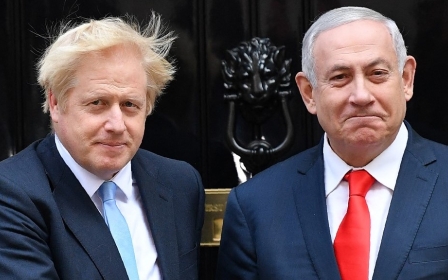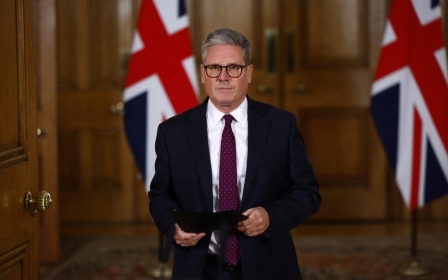UK: Robert Jenrick calls for ban on Palestine advocacy group Friends of Al-Aqsa
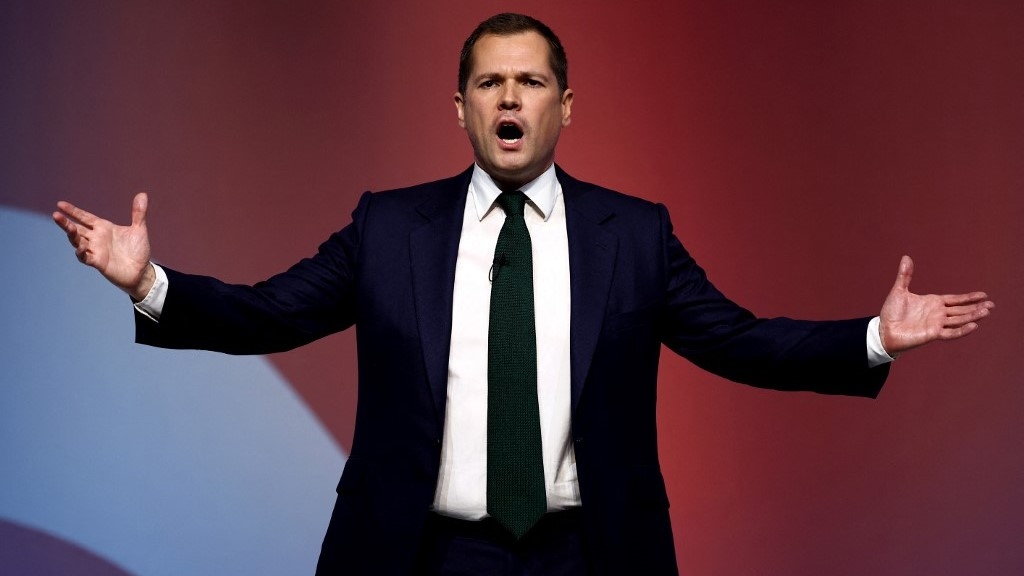
Conservative Party leadership contender Robert Jenrick has called for the UK to ban "extremist groups" like Friends of Al-Aqsa and the Palestinian Forum in Britain.
Jenrick is one of four candidates trying to win leadership of a party that was thoroughly defeated in the UK general election in July.
All of those standing to lead the Tories are ardent Zionists who back Israel's ongoing military campaign in Gaza, over which Israel is facing genocide charges at the International Court of Justice.
"We urgently need to amend our laws to combat the scale of extremism on our streets," Jenrick, the former immigration minister, wrote in a column for the Daily Mail on Monday.
"We can no longer wait to proscribe the IRGC. So we must capture the extremist groups, not involved in terrorism - like Friends of Al Aqsa or the Palestinian Forum in Britain - but that harm our communities and public order, by creating a new category for banning organisations."
New MEE newsletter: Jerusalem Dispatch
Sign up to get the latest insights and analysis on Israel-Palestine, alongside Turkey Unpacked and other MEE newsletters
The Iranian Revolutionary Guard Corps (IRGC) is an elite arm of the Iranian military, which takes the lead in the state's conflict against Israel.
By contrast, Friends of Al-Aqsa (FOA) and the Palestinian Forum in Britain are British organisations campaigning for Palestinian rights.
Neither have been designated as extremist by any past British government.
David Cameron's Conservative government tried unsuccessfully - first in 2011 and then in 2015 - to formulate a legally binding definition of extremism.
This past March, the previous Conservative government under Rishi Sunak introduced a contentious new definition of extremism, but conceded that the wording is “non-statutory” and created no new legal powers.
This means that the proposal by Jenrick, who aims to be elected as leader of the opposition this month, goes further than any government has done in seeking to ban groups designated as extremist.
Middle East Eye contacted Jenrick's campaign team to ask what, if any, definition he used to justify labelling the pro-Palestinian organisations as extremist.
There has been no response at the time of publication.
Last week, the Telegraph issued a correction after it falsely labelled the Muslim Association of Britain, a Muslim advocacy group, as "extremist".
'Witch hunt'
Ismail Patel, chair of Friends of Al-Aqsa (FOA), told MEE he believed Jenrick's "xenophobic portrayal of FOA" was "baseless and risks sparking cultural conflict".
"FOA has been involved in organising over two dozen protests over the past year, none of which involved violence or vandalism."
He added: "Jenrick's call to ban FOA from exercising their democratic rights is nothing short of a witch hunt against those shedding light on Israel's violation of international law, the ignoring of UN resolutions, the undermining of the Geneva Convention and human rights abuses.
"It's clear that Jenrick's actions are a prime example of dog whistle politics at its most shameless."
'A prime example of dog whistle politics at its most shameless'
- Ismail Patel, Friends of Al Aqsa
Adnan Hmidan, acting chair of the Palestinian Forum in Britain said: "We unequivocally deplore this attack from a political figure aspiring to lead a nation known for its values of freedom, diversity, and coexistence. Instead, we see Robert Jenrick's campaign rooted in hatred, inciting division, rejecting freedoms, and disregarding fundamental human rights.
"We condemn these reckless statements and hold Robert Jenrick both morally and legally accountable," he added.
"We demand a full retraction and apology, and we call on responsible voices within the Conservative Party to disavow candidates who sow division and intolerance."
Last week, rights group CAGE International announced that it intends to file a war crimes complaint against Jenrick and another former minister, Ben Wallace.
The move was in response to a campaign video in which Jenrick claimed that British forces are “killing" rather than capturing "terrorists" to prevent their release under human rights laws.
MEE reported in early September that Jenrick personally intervened late last year in the case of a Palestinian student whose visa was revoked after she made a speech in support of Palestine.
Jenrick appeared to acknowledge this in his newspaper column on Monday, writing: "As Immigration Minister I revoked the visas of those who valorised Hamas after October 7."
Proscribing the IRGC
When the Conservatives were in government, the then-Foreign Secretary David Cameron resisted calls to proscribe the IRGC, arguing it would be damaging for Tehran to cut off diplomatic relations with Britain.
In opposition Labour said it would proscribe the organisation, but it has not done so in government.
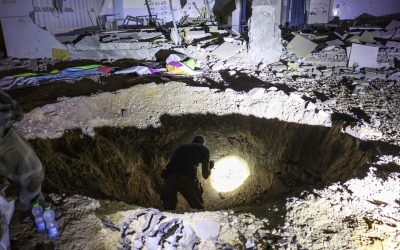
Last week, the foreign office told MEE: "Iran’s destabilisation of the Middle East, their human rights violations, nuclear escalation, and its threats against people in the UK are abhorrent.
"We will not hesitate to take the most effective measures against the regime and the Islamic Revolutionary Guard Corps.
“We are working at pace to identify further ways to deal with state threats including those from the IRGC.”
In early September, the British government imposed fresh sanctions on the IRGC Quds Force's Unit 700.
The Quds Force, which is part of Iran's Revolutionary Guards, manages relationships with allied militias across the Middle East, including Hezbollah.
Middle East Eye delivers independent and unrivalled coverage and analysis of the Middle East, North Africa and beyond. To learn more about republishing this content and the associated fees, please fill out this form. More about MEE can be found here.



